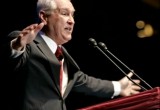Government Finds Way to Tax Churches & Non Profits
Online, March 16, 2012 (Newswire.com) - In the Middle Ages when Kings and Queens ran out of tax money they would raid the monasteries and then apologize later. The First Amendment of the U. S. Constitution was supposed to put a stop to that. But desperate economic times can lead to desperate measures. Twenty years ago the city of Canyonville, Oregon came up with its own unique way to "side step" the U. S. Constitution. It began, unannounced, charging double prices for water for all schools, churches and non-profits.
In a court case that is being carefully watched by churches and non profits across the nation, an Oregon judge will soon decide if the practice is valid.
In defense of the city government, the paperwork is right there, not covered up, but for all the world to see. That is, if you can burrow into the hundreds of pages. One of the 600 plus ordinances for the city of Canyonville, Oregon states that "churches, schools, and non-profits like our local YMCA and a non-profit senior residence will be charged double the normal water rates and substantially elevated sewage fees." One of the current ordinances explains that the surcharges are to be paid "in lieu of taxes."
Meanwhile, a sign, proudly posted in the city building tells Canyonville residents that they pay less on their water bills than neighboring towns. The non-profits, who are paying double, say that their surcharge is the reason.
Canyonville Christian Academy, founded in 1924, stumbled onto the double billing by accident, finding that the extra surcharges date back three decades and may total close to $200,000. Said the school headmaster, Cathy Lovato, "We offered to settle this for a very modest amount last Christmas but the city said no." The school, which operates on a modest budget, once voted to shut its doors in 1995. Alumni and friends donated money to help the school rebound.
Although the ordinances are written to broadly cover all non-profit water users, CCA believes that the city regulations have principally targeted ten churches and four Christian schools with the biggest bill going to the Canyonville Christian Academy.
Doug Wead, a New York Times bestselling author who is on the school board, said last June CCA notified the city government that it had discovered the improper billing but according to the academy nothing has been done to fix the problem. According to CCA, the city has held four executive/closed council meetings with their legal counsel present. Another city meeting is scheduled for Monday night.
School officials say that the school has consulted with the Oregon Attorney General, a state legislator, multiple mayors of other cities, and multiple law firms. According to Ms. Lovato, "To my knowledge, no one has advised CCA that the double charges on churches and church schools is legal. Many seem to believe that this is a clear violation of the U.S. Constitution."
On October 19, 2011 CCA offered to resolve the issue by taking a small fraction of the amount of overcharges of the last six years in the form of credits on future bills. Of course, the school also asked that the city desist in the double charges. According to Ms. Lovato, the city notified the school on December 13, 2011 that their offer was rejected. This month, the surcharges on nonprofits by the city continues and is reflected in the most recent water bill mailed to CCA.
According to Ms. Lovato, "We asked a senior city official a year ago about the rationale and legality of the surcharges, and why they were doing this and he replied, 'We do it because we can.'" Canyonville is a small town in Southern Oregon with a population of 1,700. CCA has appealed to the Douglas County Circuit Court in Roseburg, Oregon to give a ruling on the issue. If the Court upholds the City Government, it may provide other city and county governments with a backdoor method of taxation on churches and non-profits.
Meanwhile, if you are a church, Boys and Girls Club, or some other non profit, you might want to check your water bill and compare it to your neighbor. Canyonville, Oregon may not be the only city government to practice what critics charge is "backdoor taxation of the tax exempt."
